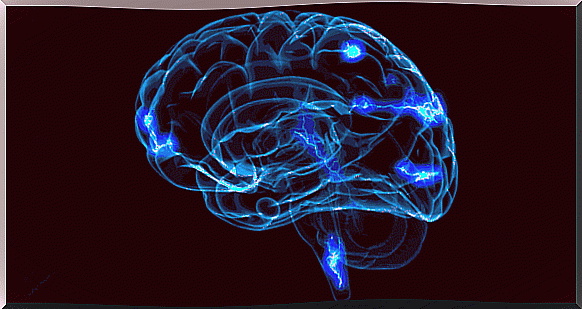Relapse Of Grief: When We Do Not Get Ahead

Relapses of grief happen more often than you think. But, far from seeing it as a relapse, we should think of it as a normal part of the grieving process. Taking two steps back can be the best thing we can do to gain momentum to move forward. Ultimately, no one gets over grief in just a few days. It is a long journey, and it is common to stop and have relapses.
Therapists with experience in treating depression, anxiety disorders, addiction and other mental illnesses all have something in common. They know that the clinical treatment strategy for patients should include a good program to prevent relapse. And it is equally important for the patient to keep in mind the possibility of a relapse.
A grieving person often hopes that this gloomy time will pass as quickly as possible. Above all, they want a moment where they can breathe without pain and sleep for a few hours without waking up in tears. We often think of the recovery process as a straight line. Each step takes us closer to the finish line.
However, this does not always seem to be the case. It is important to remember this. It is not uncommon for us to once, without understanding exactly why, end up taking two steps backwards. Or worse, we end up exactly what we started. To prevent this from happening and to avoid suffering from a relapse that is worse than the original event, we must do something. We must be prepared with an “arsenal” of measures that protect us and a resource that helps us move forward.

Why do relapses occur during the grieving process?
According to a study from the journal Biological Psychiatry, the way we process information determines whether we will experience a relapse. For example, something we can see on an MRI scan is that there are different “types” of brains. Some are better able to respond to traumatic, complex or challenging events.
There are people who handle grief better because they have a more resilient mental focus. Their thought patterns are more resilient and flexible at the same time. Other people need a little more time to treat grief. They experience more relapses because they tend to dwell on it and fixate on certain negative thoughts. In addition, they treat stimuli in a more negative way. This means that they experience greater mental exhaustion. The patient gets stuck and has difficulty getting forward because they use so much energy.
Now, just because there are different ways of processing information and different mental approaches, does not mean that some people are doomed to have a relapse of grief, while others do not want it. If there is one thing we know about the brain, it is that it has incredible plasticity and we can train it. It is possible to shape it and grind off the edges that make us more vulnerable. We can all achieve that. Let’s see how…

Strategies to avoid relapse of grief
As we said before, good psychologists and healthcare professionals know that they need to treat patients on two levels. This is true whether we are talking about an illness, a disorder or a problematic event. They need to develop an intervention strategy and a plan to avoid relapse. It is important to make sure that the patient remains in a state where they can find strength and encouragement to continue.
We now want to invite you to reflect on some of the strategies you can use on a daily basis.
Accept the possibility that you may have a relapse during the grieving process
Sometimes circumstances force us to start over. A loss, whether physical or emotional, involves a form of fall. It is a time of sorrow where everything falls apart around us, and we must rebuild ourselves. We must learn to walk again.
During this process, taking two steps forward and one step back is very common. Do not see it as a problem, or take it as a sign that it is not possible to move forward. Understand that sometimes you have to take a step back to make the drive jump forward.
Relapses take many forms
We need to be aware of all the different forms a relapse can take. If we are prepared, we can react a little faster.
- Relapses of grief often occur when we are in a bad mood.
- A relapse can make you feel tired and as if you do not have energy. But it can also make you feel like you need to be constantly busy. You have to be busy so that you do not think.
- You should also be careful about substance abuse. Some people feel compelled to start drinking or they trust that consuming certain drugs will help them.

Mindfulness to prevent relapse of grief
Mindfulness, or mindful presence, can be very helpful for people who have experienced depression. If you are grieving or trying to get over an addiction, mindfulness is a helpful strategy. It helps you develop better mental control, and also opens a powerful channel for dealing with emotional distress.
- Similarly, mindfulness can be especially helpful in regulating negative or lingering thought patterns. It gives you inner peace and better regulation of emotions such as anger, frustration or sadness.
- On the other hand, being present will help the patient to have a good internal dialogue. He or she will be able to respond better and understand their needs, fears and worries because they will be related to themselves.
Finally, it is worth mentioning that practicing mindfulness requires consistency. It is important to introduce it to your daily routine. That way, it will be really beneficial and help you avoid a relapse.
References
Here you can read about the study from the Biological Psychiatry magazine.









